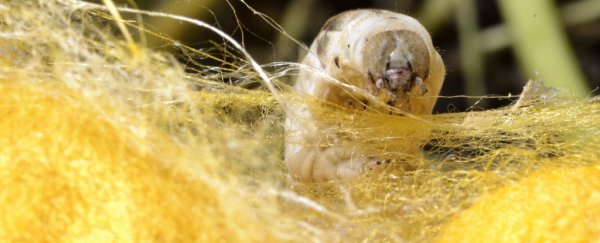Scientists have created microscopic versions of silkworm cocoons that protect sensitive drugs from degradation during storage and processing.
They hope that the microscopic cocoons will prolong the shelf life of pharmaceuticals and enable the development of new treatments against cancer, or neurodegenerative conditions such as Alzheimer's and Parkinson's diseases.
It's common for scientists to be inspired by nature's best inventions and use them for our own advantage.
In the past, scientists have used a catalyst inspired by naturally occurring enzymes to produce fuel, turned to cactus' and pitcher plants to invent efficient ways to harvest water and now have used silk from the cocoon of Bombyx mori silkworms to produce protective homes for molecules.
A multi-university team set out to tackle a common issue faced by drug researchers: What's the best way to protect sensitive therapeutic molecules?
"It is a common problem in a range of areas of great practical importance to have active molecules that possess beneficial properties but are challenging to stabilise for storage," says lead researcher Tuomas Knowles from the University of Cambridge, UK.
The scientists were inspired by nature's own protective casing – a silk cocoon – that could be used to house tiny particles of beneficial molecular "cargo" in products, such as cosmetics and food.
"A conceptually simple, but powerful, solution is to put [sensitive molecules] inside tiny capsules. Such capsules are typically made from synthetic polymers, which can have a number of drawbacks, and we have recently been exploring the use of fully natural materials for this purpose. There is potential to replace plastics with sustainable biological materials, such as silk, for this purpose" said Knowles.
To manufacture the tiny cocoons, the scientists developed a unique microengineering process that mimicked the natural process of the silk worms. The researchers made a tiny artificial spinning duct in a microfluidic channel that could pump out capsules 1000 times smaller than those made by actual silkworms.
Researcher from Sheffield University, Chris Holland, said "Silk is amazing because whilst it is stored as a liquid, spinning transforms it into a solid," said one of the team, Chris Holland from the University of Sheffield. "This is achieved by stretching the silk proteins as they flow down a microscopic tube inside the silkworm."
There are some other benefits to using silk too.
Silk is biodegradable and requires less energy to manufacture. It is already being used in some surgical products, including brain implants, optical devices, cell scaffolding and adhesive gels, it also has potential to be safe when used in humans.
The researchers tested the cocoon's protective powers on a real-world molecule with known problems – antibodies.
"Some of the most efficacious and largest selling therapeutics are antibodies," said researcher Michele Vendruscolo from Cambridge Centre for Misfolding Diseases.
"However, antibodies tend to be prone to aggregation at the high concentrations needed for delivery, which means that they are often written off for use in treatments, or have to be engineered to promote stability."
The researchers are hopeful that nature has some more natural materials that they can use in their new process.
"By containing such antibodies in micrococoons, as we did here, we could significantly extend not just their longevity, but also the range of antibodies at our disposal," said Knowles.
"We are very excited by the possibilities of using the power of microfluidics to generate entirely new types of artificial materials from fully natural proteins".
The study was published in Nature Communications.
